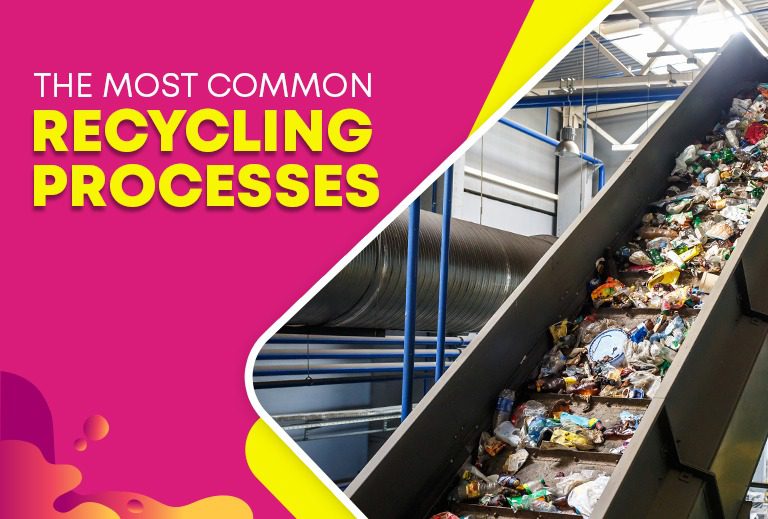4 Common Plastic Recycling Processes You Should Be Aware Of
Many organizations have embraced strategies that ensure efficient recycling of plastic. This has helped contribute to the plastic industry’s transition to a circular economy while reducing harmful emissions. By retaining discarded plastic waste as a useful resource in the circular economy, industries have been able to save a lot of money and resources.
The recycling process begins with the collection stage where plastic is collected from various resources. This is followed by the sorting stage where separated plastic is delivered to plants where recycling takes place through any of the following processes:
- Mechanical recycling:
In this process, plastic waste is converted into secondary raw products or materials. This is done without changing its chemical structure. Mechanical recycling is easily the most popular recycling process and it can be used to recycle a variety of thermoplastics without impacting their quality.
- Chemical recycling:
In this process, chemical methods such as gasification, pyrolysis, hydro-cracking, and depolymerisation are applied to alter the chemical structure of plastic waste. This conversion results in the creation of plastic with shorter molecules, which are then deployed as feedstock for newer chemical reactions to create new recycled plastic. This process offers immense scalability for the recycling industry.
- Dissolution recycling:
In this process, purification takes place. The polymer present in plastic waste is dissolved by using a solvent. This ensures the polymer is separated from the waste and collected in its pure form without any change in chemical nature. Various forms of polymers such as polystyrene (PS), polyvinyl chloride (PVC), nylon, and polypropylene already use this method to get separated from mixed plastic material waste.
- Organic recycling:
In this process, biodegradable plastic waste undergoes microbiological treatment in a controlled environment under aerobic or anaerobic conditions. The output of this process includes organic residues, methane, carbon dioxide, and water.
As organizations focus more on plastic recycling, lesser amounts of plastic waste end up in incineration plants and landfills. Recycling helps to save energy and production costs by controlling the negative impact caused by the extraction of virgin materials.
To learn more about recycling in the plastic industry, we invite you to Plastivision 2023 (December 7 to 11, 2023). The prestigious event will be held at the Bombay Exhibition Centre, Mumbai. Plastivision will be attended by the finest minds in the industry, giving you a unique networking opportunity right here in India. Call the Plastivision team at 022 6777 8846/48/+91 99303 55494 to learn more about the event!
Leave a Reply Cancel reply
Recent Posts
- Understanding The Materials That Are Used To Build Plastic Toys
- All You Need To Know About Food-grade Plastics
- A Glance At The Materials That Boost The Performance Of Plastics
- Understanding The Importance Of Exploring New Business Opportunities In The Plastic Industry
- Understanding The Importance Of Investing in R&D For The Plastic Industry
Categories
- 3D Printing
- AIPMA
- Automation
- Automobile Sector
- Bio Plastics
- Environment
- Innovations In Recycling
- Latest Innovations
- Molds & Dies
- News
- Packaging Industry
- Plastic
- Plastic Application
- Plastic Industry
- Plastic Market
- Plastic Myths
- Plastic News From The World
- Plastic Packaging
- Plastic Products
- Plastic Recycling
- Plastic Solar Cells
- Plastic Toys
- Plastic Waste
- Plastic World
- Plastics
- Plastics And Their Applications
- Plastics In Agriculture
- Plastics In Healthcare
- Plastics In Medical Industry
- Plasticulture
- Processing Machinery
- Recycling Machines
- Robotics
- Uncategorized
- Virtual Reality
Archives
- November 2023 (3)
- October 2023 (2)
- September 2023 (3)
- August 2023 (3)
- July 2023 (3)
- June 2023 (3)
- May 2023 (2)
- April 2023 (2)
- March 2023 (2)
- February 2023 (2)
- January 2023 (2)
- December 2022 (3)
- November 2022 (1)
- October 2022 (1)
- September 2022 (2)
- August 2022 (1)
- July 2022 (3)
- May 2022 (3)
- March 2022 (2)
- February 2022 (1)
- January 2022 (1)
- September 2021 (2)
- August 2021 (3)
- July 2021 (4)
- June 2021 (4)
- May 2021 (3)
- April 2021 (2)
- March 2021 (4)
- November 2019 (8)
- October 2019 (8)
- September 2019 (8)
- August 2019 (8)
- July 2019 (8)
- June 2019 (8)
- May 2019 (8)
- April 2019 (8)
- March 2019 (8)
- February 2019 (11)
- January 2019 (8)
- December 2018 (8)
- November 2018 (12)
- October 2018 (12)

